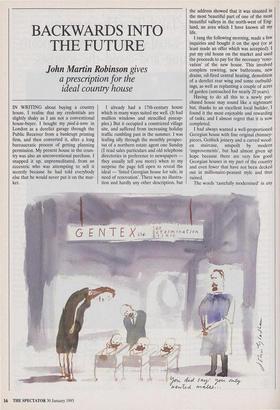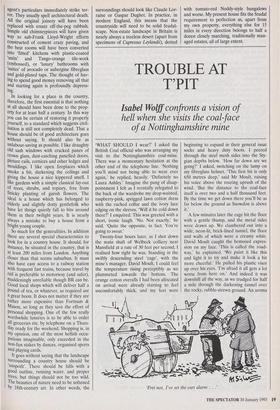BACKWARDS INTO THE FUTURE
John Martin Robinson gives
a prescription for the ideal country house
IN WRITING about buying a country house, I realise that my credentials are slightly shaky as I am not a conventional house-buyer. I bought my pied-a-terre in London as a derelict garage through the Public Receiver from a bankrupt printing firm, and then converted it, after a long bureaucratic process of getting planning permission. My present house in the coun- try was also an unconventional purchase. I snapped it up, unpremeditated, from an eccentric who was attempting to sell it secretly because he had told everybody else that he would never put it on the mar- ket.
I already had a 17th-century house which in many ways suited me well. (It had mullion windows and stencilled pineap- ples.) But it occupied a constricted village site, and suffered from increasing holiday traffic rumbling past in the summer. I was leafing idly through the monthly prospec- tus of a northern estate agent one Sunday (I read sales particulars and old telephone directories in preference to newspapers they usually tell you more) when to my surprise the page fell open to reveal the ideal — 'listed Georgian house for sale, in need of renovation'. There was no illustra- tion and hardly any other description, but the address showed that it was situated in the most beautiful part of one of the most beautiful valleys in the north-west of Eng- land, an area which I have known all my life.
I rang the following morning, made a few inquiries and bought it on the spot (or at least made an offer which was accepted). I put my old house on the market and used the proceeds to pay for the necessary 'reno- vation' of the new house. This involved complete rewiring, new bathrooms, new drains, oil-fired central heating, demolition of a derelict rear wing and some outbuild- ings, as well as replanting a couple of acres of garden (untouched for nearly 20 years).
Having to do all this to a newly pur- chased house may sound like a nightmare but, thanks to an excellent local builder, I found it the most enjoyable and rewarding of tasks, and I almost regret that it is now completed.
I had always wanted a well-proportioned Georgian house with fine original chimney- pieces, Gothick joinery and a carved wood- en staircase, unspoilt by modern `improvements', but had almost given up hope because there are very few good Georgian houses in my part of the country and even fewer that have not been decked out in millionaire-peasant style and thus ruined.
The words 'tastefully modernised' in any agent's particulars immediately strike ter- ror. They usually spell architectural death. All the original joinery will have been replaced with ersatz off-the-peg rubbish. Simple old chimneypieces will have given way to sub-Frank Lloyd-Wright efforts constructed of cement crazy paving, and the best rooms will have been converted into 'fitted' kitchens with plastic-coated `units' and Tango-orange tile-work (embossed), or 'luxury' bathrooms with `suites' of avocado or aubergine fibreglass and gold-plated taps. The thought of hav- ing to spend good money removing all that and starting again is profoundly depress- ing.
In looking for a place in the country, therefore, the first essential is that nothing at all should have been done to the prop- erty for at least half a century. In this way You can be certain of restoring it properly yourself, to a standard which suggests civil- isation is still not completely dead. That a house should be of good architecture goes without saying. It should also be as unlabour-saving as possible. I like draughty old sash windows with cracked panes of crown glass, dust-catching panelled doors, picture rails, cornices and other ledges and mouldings. I like open fireplaces which smoke a bit, darkening the ceilings and giving the house a nice kippered smell. I like gardens with a simple classical lay-out of trees, shrubs, and topiary, free from finicky planting of garish flowers. The ideal is a house which has belonged to elderly and slightly dotty gentlefolk who have let things quietly fall to bits around them in their twilight years. It is nearly always a mistake to buy a house from a bright young couple.
So much for the generalities. In addition there are several special characteristics to look for in a country house. It should, for instance, be situated in the country, that is at least 200 miles from London. Anything closer than that seems suburban. It must also have easy access to a railway station with frequent fast trains, because travel by rail is preferable to motorway (and safer), maddeningly unreliable though BR can be. Good local shops which will deliver half a pound of tea, or whatever, as required are a great boon. It does not matter if they are rather more expensive than Fortnum & Mason, so long as they save the effort of Personal shopping. One of the few really worthwhile luxuries is to be able to order all groceries etc. by telephone on a Thurs- day ready for the weekend. Shopping is, in my opinion, one of the most hellish occu- pations imaginable, only exceeded in the non-fun stakes by dances, organised sports and playing cards.
It goes without saying that the landscape Surrounding a country house should be unspoilt'. There should be hills with a good outline, running water, and proper trees, but things should not be too wild. The beauties of nature need to be softened by 18th-century art. In other words, the
surroundings should look like Claude Lor- raine or Gaspar Dughet. In practice, in modern England, this means that the countryside will need to be solid feudal- scape. Non-estate landscape in Britain is nearly always a treeless desert (apart from specimens of Cupressus Leylandii), dotted
with tomato-red Noddy-style bungalows and worse. My present house fits the feudal requirement to perfection as, apart from my own property, everything else for 15 miles in every direction belongs to half a dozen closely marching, traditionally man- aged estates, all of large extent.











































































 Previous page
Previous page